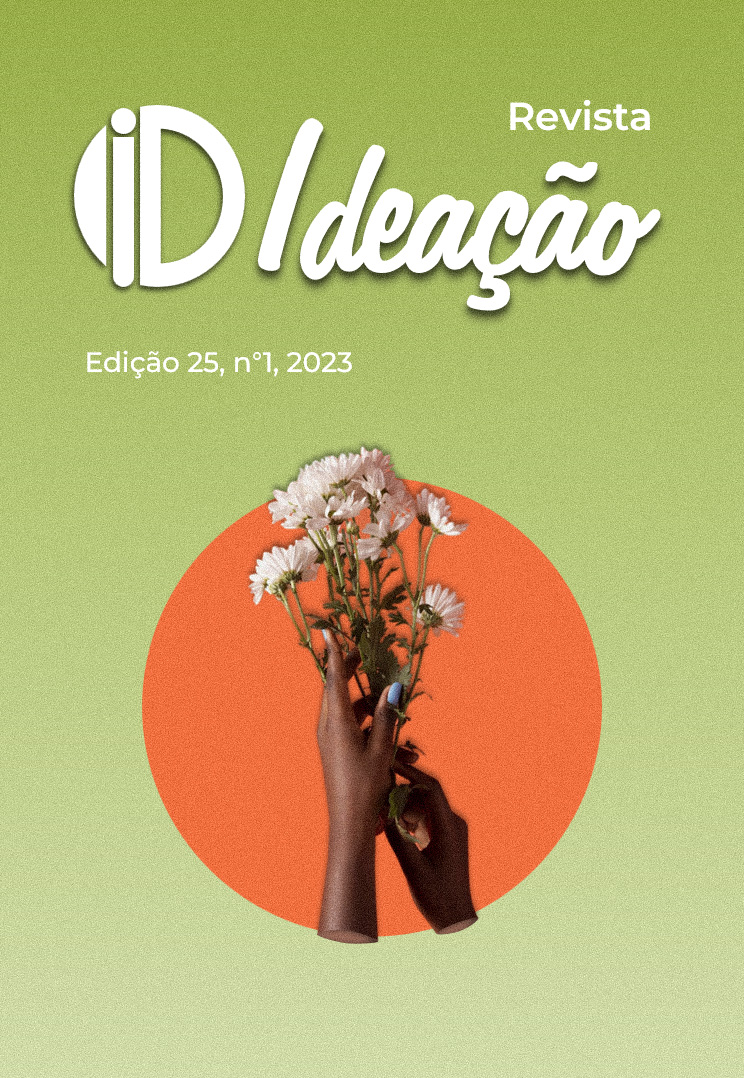Constituindo-se sujeito no país do outro
DOI:
https://doi.org/10.48075/ri.v25i1.29727Palabras clave:
Identidade migrante, autonarrativa, memória, decolonialidade, estudos do discursoResumen
O artigo apresenta um estudo sobre representações do migrante pela perspectiva teórica discursiva e decolonial, partindo da autonarrativa de uma migrante beninense, estudante universitária no Brasil, como um modo de trazer à tona discursos silenciados de grupos minoritarizados, como o da migrante, e de conhecer um pouco sobre a identidade desse sujeito em deslocamento. Utilizaremos como dispositivo metodológico a Análise de Discurso de linha francesa, que estabelece a articulação entre materialidade linguística e história para a produção de sentidos. O corpus é constituído pois, de recortes discursivos da autonarrativa da migrante a partir da seleção de eixos temáticos que caracterizam regularidades, entre outras categorias de análise baseadas na semântica global de Dominique Maingueneau. O objetivo geral é analisar as representações identitárias que o sujeito tem de si e do outro brasileiro que emergem no discurso autonarrativo, a fim de discutir indícios da constituição subjetiva e identitária de quem fala e os processos de formação de memória que acontecem entre culturas e línguas. Para o uso da autonarrativa como possibilidade de construção de conhecimento, trazemos o estudo de Michel Foucault sobre a escrita de si, entre outros autores que falam sobre a importância das histórias de vida. Para fundamentar teoricamente as noções de memória, diferença e identidade, apoiamo-nos nos estudos culturais, além do olhar decolonial para lidar com as identidades subjugadas das minorias. Com essa reflexão, entendemos que é possível romper com o pensamento hegemônico único, eurocêntrico, que dá espaço enunciativo e relevância somente às narrativas dos povos privilegiados em detrimento do dominado, do sujeito colonizador em detrimento do colonizado, do sujeito hegemônico em detrimento do sujeito ordinário ou “infame” de que fala Foucault, valorizando, então, o lugar de fala de uma migrante negra e dando relevância à sua existência invisibilizada e silenciada no país hospedeiro, o qual, muitas vezes, lhe é hostil.
Descargas
Publicado
Cómo citar
Número
Sección
Licencia
Derechos de autor 2022 Direitos partilhados conforme licença CC BY-NC-SA 4.0

Esta obra está bajo una licencia internacional Creative Commons Atribución-NoComercial-CompartirIgual 4.0.
Política a respecto de publicaciones periódicas de libre acceso
Los autores que publican en esta revista están de acuerdo con los siguientes términos:
1. Los autores conservan los derechos de autor y conceden a la revista el derecho de primera publicación, y la obra se licencia simultáneamente bajo la Licencia de Atribución de Creative Commons, lo que permite que la obra se comparta con el reconocimiento de la autoría y la publicación inicial en esta revista.
2. Los autores están autorizados a asumir contratos adicionales por separado, para la distribución no exclusiva de la versión de la obra publicada en esta revista (por ejemplo, para publicarla en un depósito institucional o como capítulo de un libro), con reconocimiento de la autoría y la publicación inicial en esta revista.
3. Se permite y alienta a los autores a que publiquen y distribuyan su trabajo en línea (por ejemplo, en repositorios institucionales o en su página personal) en cualquier momento antes o durante el proceso editorial, ya que ello puede generar cambios productivos, así como aumentar el impacto y la citación del trabajo publicado (véase El efecto del acceso abierto).
Licencia Creative Commons
Esta obra está licenciada bajo una Licencia Internacional Creative Commons Reconocimiento-No comercial-CompartirIgual 4.0, que permite compartir, copiar, distribuir, exhibir, reproducir, en su totalidad o en partes, siempre que no tenga un propósito comercial y se citen los autores y la fuente.


